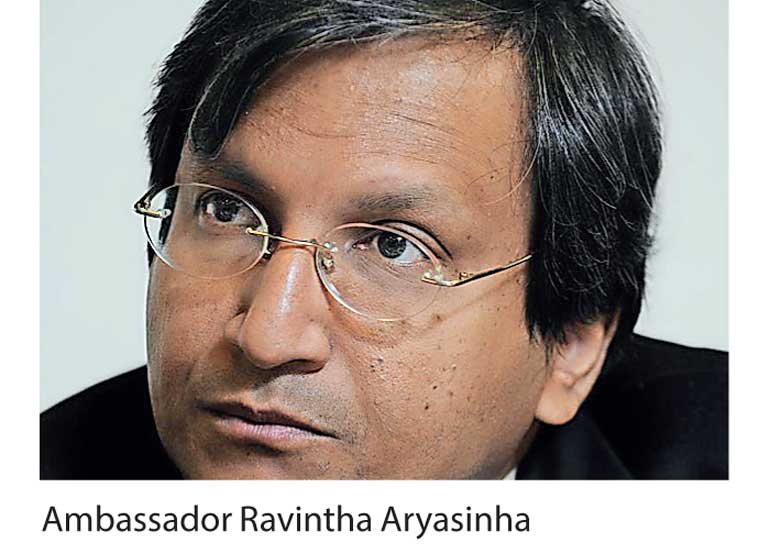Tuesday Feb 24, 2026
Tuesday Feb 24, 2026
Wednesday, 8 March 2017 00:10 - - {{hitsCtrl.values.hits}}

By Dharisha Bastians in Geneva
The Sri Lanka resolution at the 34th Session of the UN Human Rights Council should contain a timeframe for implementation of transitional justice commitments the country had made in 2015, several member states said, when the first informal session on the draft resolution to promote reconciliation and accountability in Sri Lanka got underway in Geneva yesterday.
During the informal session on the ‘zero draft’ of the resolution, Sri Lanka’s Permanent Representative to the UN in Geneva, Ambassador Ravintha Aryasinha officially announced that the Government would co-sponsor the resolution led by the US at the current session of the Human Rights Council.
“Sri Lanka will cosponsor the resolution that provides a two-year extended timeline for the implementation of commitments contained in Resolution 30/1 of 2015,” Ambassador Aryasinha said as the informal session opened. Ambassador Aryasinha also thanked the core group of sponsors of the Sri Lanka resolution – the US, UK, Macedonia and Montenegro – for their consultations with the Sri Lankan Government on the text of the draft resolution.
Addressing the informal session, Ambassador Aryasinha said Sri Lanka was carefully studying the views, observations and recommendations of the report of the UN High Commissioner for Human Rights. “The views and observations are constructive and meaningful for us as we strive to promote human rights, reconciliation and accountability in Sri Lanka,” the Sri Lankan envoy noted.
The Government of Sri Lanka did not request amendments to the draft resolution at yesterday’s informal session.
During the discussion on the language of the draft resolution on Sri Lanka, delegations of the European Union, Australia and Switzerland, strongly reiterated the call for an accountability mechanism with an international component to be a part of the Government’s transitional justice process.
Suggesting amendments to the draft resolution, the Delegation of Switzerland said the resolution should call for a roadmap or action plan from the Government of Sri Lanka with a time-bound plan to implement resolution 30/1 of 2015.
“Trust is of the essence in reconciliation and trust has been eroding on the ground,” the representative of Switzerland said.
Switzerland’s call to require Sri Lanka to provide a timetable for implementation of its transitional justice mechanisms found broad support at the informal session, with several member states and international rights groups requesting that this request be reflected in the draft resolution to be adopted at the Council later this month.
While the ‘zero draft’ of the Sri Lanka resolution mandates reporting by the High Commissioner for Human Rights on progress on implementation in writing at the 37th session and a comprehensive report at the 40th session in March 2019, the delegation of Canada called for an amendment of operative paragraph 4 of the draft, to request the High Commissioner to provide an oral update of progress at the Council’s 36th session which will take place in September 2017.
The representative from Ireland, said the country was “disappointed” with the pace of progress on reconciliation on the ground in Sri Lanka. Ireland urged that the draft resolution be amended to reflect the need for accelerated progress on reconciliation.
The informal session on Sri Lanka was chaired by Britain’s Permanent Representative to the UN, Julian Braithwaite, while US Deputy Assistant Secretary of State Erin Barclay and ambassadors from Macedonia and Montenegro also sat at the head table.
Speaking at the opening of the informal session, Deputy Assistant Secretary Barclay said the present draft had been prepared by the core-group of sponsors, in consultation with the Sri Lankan Government. “We understand these processes are complex,” Barclay noted, in her opening remarks, “and the Government has made significant progress. But more needs to be done.”
The new resolution to be adopted at the Council later this month would give Sri Lanka two more years to fully implement its commitments from the 2015 resolution, the US official said. Since the 2017 resolution on Sri Lanka would represent an extension of the original timeframe for implementation, the Human Rights Council would be kept updated on implementation progress at its 37th and 40th sessions, Barclay explained. “No aspects of resolution 30/1 has been changed,” Barclay asserted, adding, “the core group engaged constructively with Sri Lanka on this resolution and this zero draft is a product of that engagement.
Human Rights Watch (HRW) Geneva Director, John Fisher said the organisation would have wished for a more substantive resolution that better reflected the findings of the High Commissioners’ report of progress to the Council. HRW stressed the importance of timebound implementation of the 2015 resolution and supported the call for an additional update from the UN High Commissioner for Human Rights made by Canada during its intervention at the informal session.
Several Tamil lobby groups also made interventions at the informal session, calling on the High Commissioner for Human Rights to refer Sri Lanka’s case to the UN General Assembly and on towards the International Criminal Court, through the UN Security Council. “Enough is enough,” said P. Manivannan, a representative of the Transitional Government of Tamil Eelam (TGTE), who accosted Foreign Minister Mangala Samaraweera after his speech to the Council in Geneva last week.
Victim groups and several Tamil MPs do not support the rollover of Resolution 30/1 of 2015 with an extended timeframe, the TGTE representative said. The Tamil lobbyist got emotional during his intervention, raising his voice and banging on the desk, prompting a gentle rebuke from the Chair, which called on representatives to “maintain decorum” at the meeting.
Another TGTE member, who made an intervention on the ‘zero draft’, reiterated the call for Sri Lanka’s referral to The Hague, and said the country had to face consequences for non-compliance with the 2015 UN resolution.